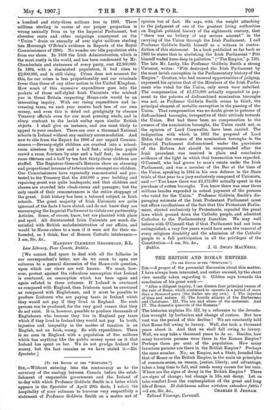[To THE EDITOR OF THE "Srscrsros.1
Sm,—Without entering into the controversy as to the accuracy of the analogy between Canada before the estab- lishment of responsible government and the Ireland of to-day with which Professor Goldwin Smith in a letter which appears in the Spectator of April 20th deals, I solicit the hospitality of your columns to traverse very respectfully a statement of Professor Goldwin Smith on a matter not of
opinion but of fact. He says, with the weight attaching to the judgment of one of the greatest living authorities on English political history of the eighteenth century, that " there was no bribery of any serious amount" in the carrying of the Union through the Irish Parliament. I call Professor Goldwin Smith himself as a witness in contra. diction of this statement. In a book published so far back as 1863 be states that in abolishing the Irish Parliament " Pitt himself waded knee-deep in pollution" (" The Empire," p. 126). The late Mr. Lecky, like Professor Goldwin Smith a strong Unionist, writes "Pitt destroyed the Irish Parliament by the most lavish corruption in the Parliamentary history of the Empire." Grattan, who had unusual opportunities of judging, expressed his opinion that of the Members of the Irish Parlia- ment who voted for the Union, only seven were unbribed. The compensation of £1,275,000 actually expended in pay- ment to the patrons of disfranchised nomination boroughs was not, as Professor Goldwin Smith seems to think, the principal element of metallic corruption in the passing of the Union. That compensation was no doubt given to patrons of disfranchised boroughs, irrespective of their attitude towards the Union. But had there been no compensation to the owners of the nomination boroughs, the Union could not, in the opinion of Lord Cornwallis, have been carried. The indignation with which in 1832 the proposal of Lord Eldon that the owners of the nomination boroughs in the Imperial Parliament disfranchised under the provisions of the Reform Act should be compensated after the Irish precedent was received is plain and conclusive evidence of the light in which that transaction was regarded. O'Connell, who had grown to man's estate under the Irish Parliament, and was a member of the Bar at the time of the Union, speaking in 1844 in his own defence in the State trials of that year to a jury exclusively composed of Unionists, said :—" You know there was 21,275,000 actually spent in the purchase of rotten boroughs. You know there was near three millions besides expended in actual payment of the persons who voted for the Union." Professor Goldwin Smith's dis- paraging estimate of the Irish Protestant Parliament must not efface recollections of the fact that this Protestant Parlia- ment, elected exclusively by Protestants, repealed the penal laws which ground down the Catholic people, and admitted Catholics to the Parliamentary franchise. We may well believe with O'Connell that if that Parliament had not been extinguished, a very few years would have seen the removal of every religious disability and the admission of the Catholic people to a full participation in all the privileges of the Constitution.—I am, Sir, &c.,














































 Previous page
Previous page